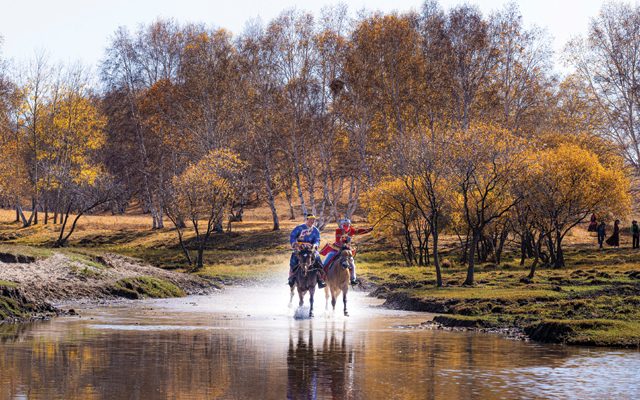Soul-stirring and eye-opening destination experiences are top of luxury travellers’ wishlist today, and this appetite will change how tours are curated

Transformational travel was slated to be the new buzz-word in the luxury market pre-pandemic. But even with the travel freeze today, experts predict that demand will soar once tourism resumes, fuelled by greater keenness among high-end travellers on curated magical experiences away from the crowds.
Christopher Lund, head of hotels at Colliers International, said there would be a huge shift in focus to itineraries that go the extra mile in allowing travellers to escape and have meaningful experiences.

destination experience in demand today
He noted: “There will be much more of a focus on experiences. Holidays where travellers can take something away, especially around eco-tourism, wellness and conservation, as these all conform with the social distancing that has now become the norm.”
Pre-pandemic, Asia’s luxury tourism players had already been going the extra mile to curate experiences that money cannot buy. From accompanying a private butler to his village, to helping plant coral reefs and meditating with monks, ultra-wealthy travellers no longer mind roughing it if it means securing an extra-special experience that pushes personal growth.
Andreas Grosskinsky, general manager at Destination Asia Indonesia, said for the last decade, luxury travel has been moving into the experiential arena, with more high-end travellers willing to splash out to enjoy authentic local experiences in style. That has changed with the pandemic, with guests becoming more willing than ever to trade in traditional luxury comforts for an incredible once-in-a-lifetime transformational experience.
Grosskinsky noted that “it’s taken some time to educate travel consultants on this”.
Tim Cordon, Radisson Hotel Group’s area senior vice president, agreed that transformational experiences will be in high demand, and that hotels and travel companies should work together to make the most of this trend.
Curating bespoke experiences for high-end guests is high on the agenda at The Pavilions Hotels and Resorts, which crafts a range of Curated Journeys for guests, covering a range of niches, including culinary, adventure, recreation, wellness and family.
Simona Chimenti, general manager at The Pavilions Bali, said: “The big next step is somewhere in between experiential and transformational travel. Guests want to mix with locals and get a real feeling of local life. It’s still luxury but there’s an emphasis on experiences. I call it laidback luxury.”
She added the desires of luxury travellers are changing from simply seeking five-star accommodation and high-end restaurants and transport, to experiencing each destination and the lives of the people who call it home.
Noted Chimenti: “The definition of luxury is shifting, it used to be about sitting in a golden cage and not going outside. Today, people are more interested in genuine service and creating memories to take back home and less about that standard luxury version.”
For example, The Pavilions Himalayas customises hikes for guests to meet monks at a monastery. At other properties in Asia, guests can go with their private butler back to his/her home village, and join a horse whisperer for a horseback adventure across Mongolia’s plains.
Chimenti said: “We really want to capture the essence of a destination and offer something that goes off the traditional beaten path.”
Climate change concerns are also shaping the transformational travel trend, with high-end clients wanting to leave as little impact on the environment as possible while helping to create a better world during their stay – another area Lund expects to see an uptick in demand within the luxury arena.
Five-star resort The Datai Langkawi gives transformational experiences an environmental twist. Located in a remote alcove at the foot of a 10 million-year-old rainforest, the resort has recruited naturalists and marine biologists to curate a series of nature-based experiences.
Spokesperson Celine Maginel said luxury travellers now sought more than the usual “bling bling”, and the property could inject something extra from its presence among nature and biodiversity.
The resort works with local NGOs and involves guests in conservation and community work. This includes helping to transport coral from onsite nurseries and joining local artists in upcycling waste.
Rascal Voyages has also tapped into the conservation movement, curating transformational experiences onboard its exclusive floating villas while embracing the shift away from traditional luxury.
CEO Stephen Ebsworth said: “We’re trying to move away from privilege and stuffiness.
“Exclusive, private, remote experiences that are close to nature will be well positioned for luxury travel in the near future.”
As part of offerings, Rascal Voyages operates bespoke exploration cruises that team up with environmental NGO Conservation International to deliver unforgettable experiences with three of the world’s best marine biologists. Guests can help to tag sea turtles, follow their migration path, and help marine biologists with their work.
During the first five exploration cruises, 25 new species of fish and a walking shark were discovered. Guests can even get to name any species they find.
Said Ebsworth: “By very definition, travel should be submerging visitors in an experience and be educational. People want to learn something and take that away.”



















